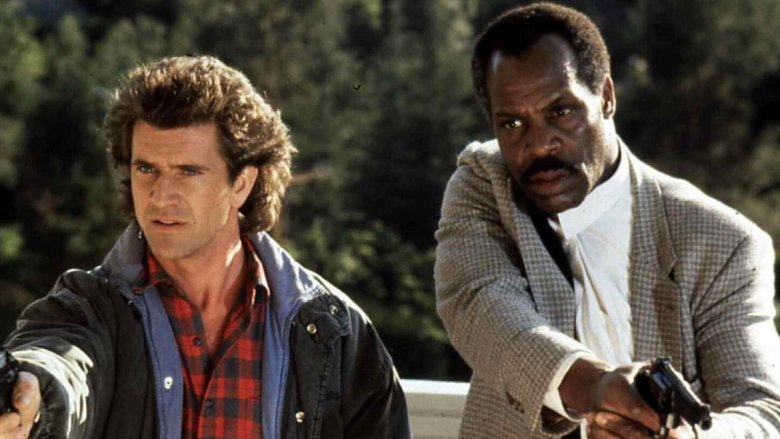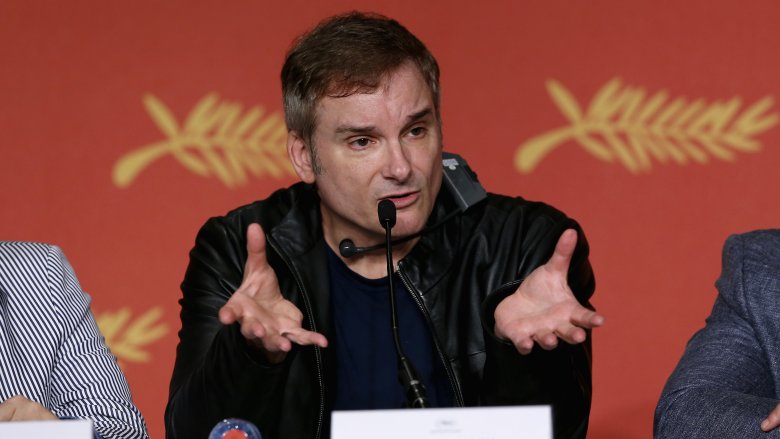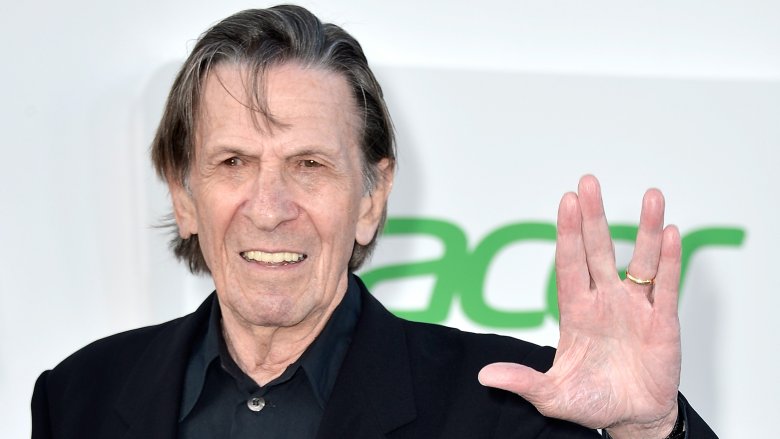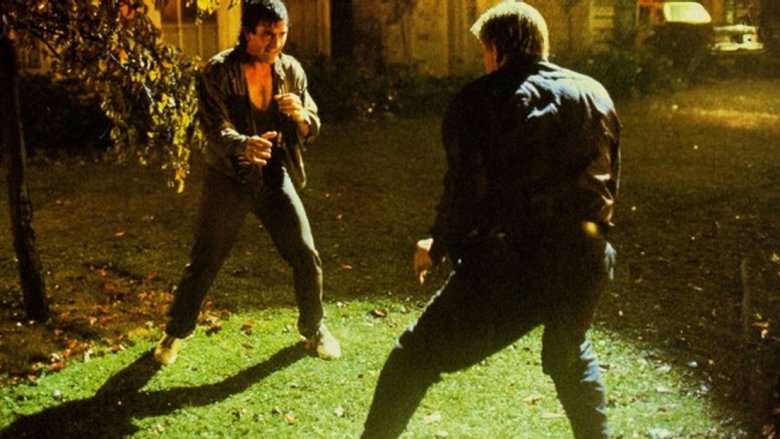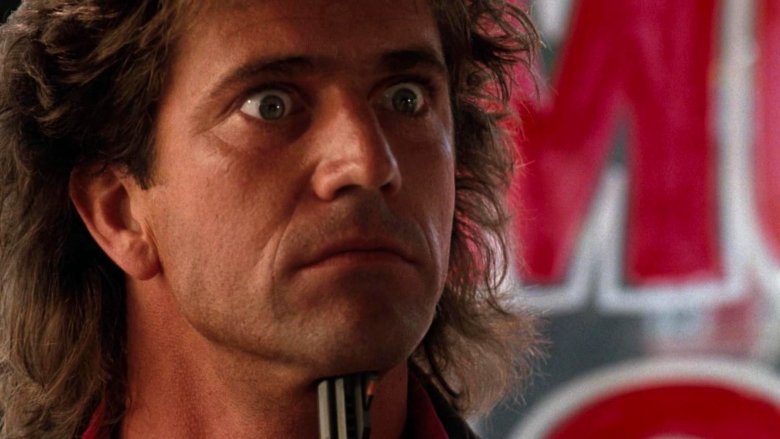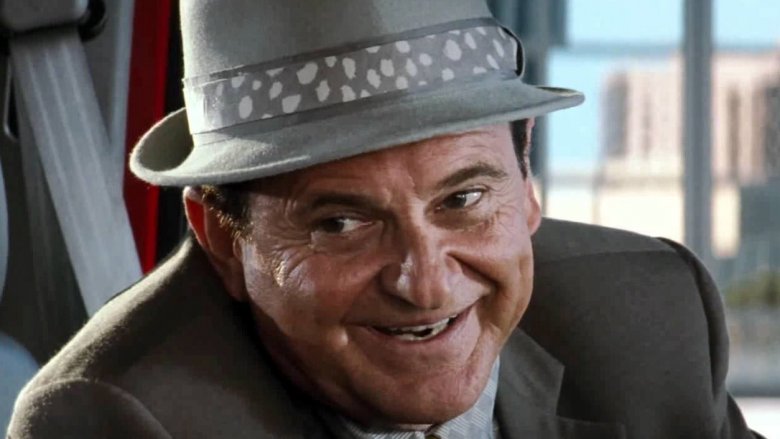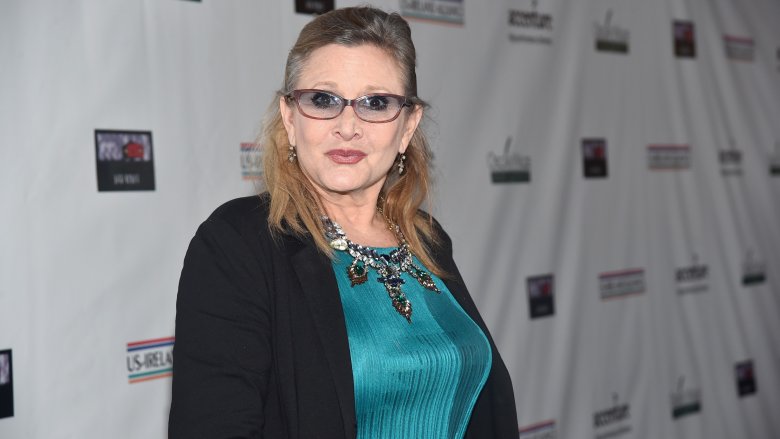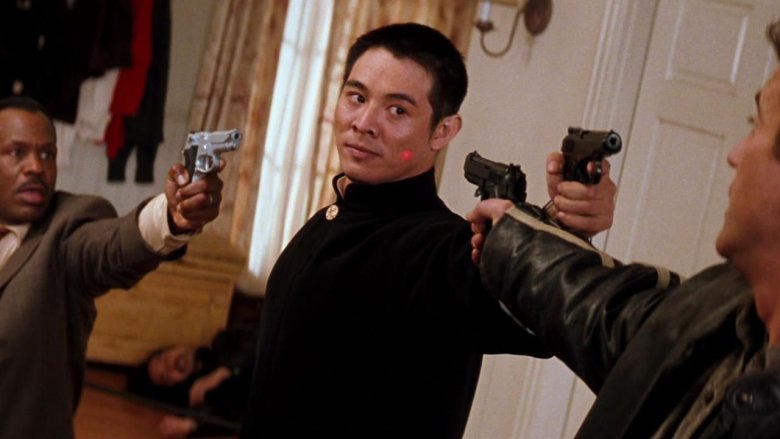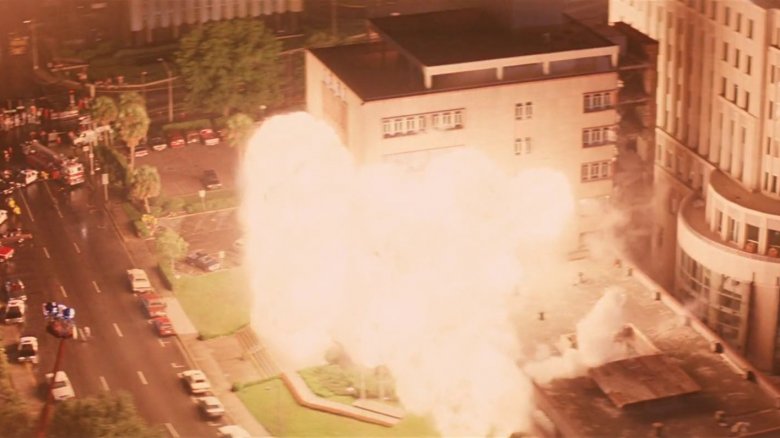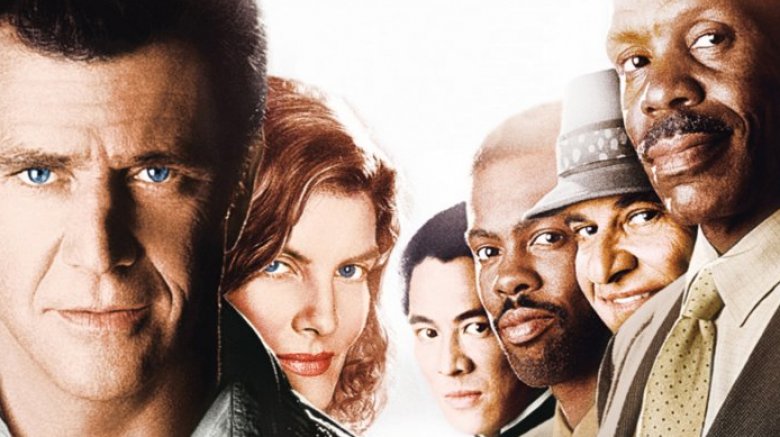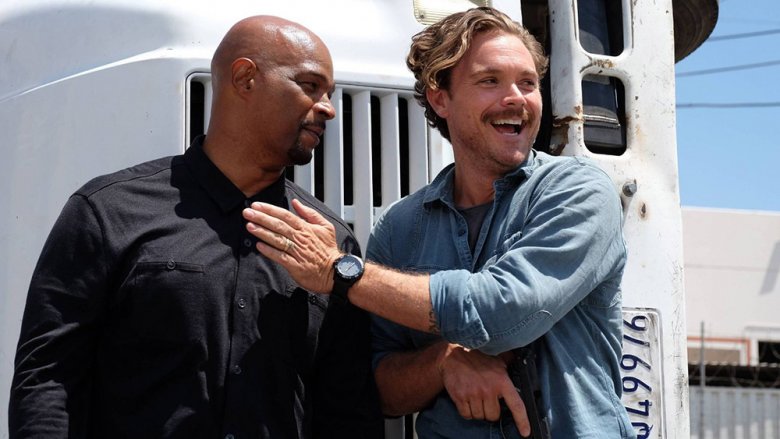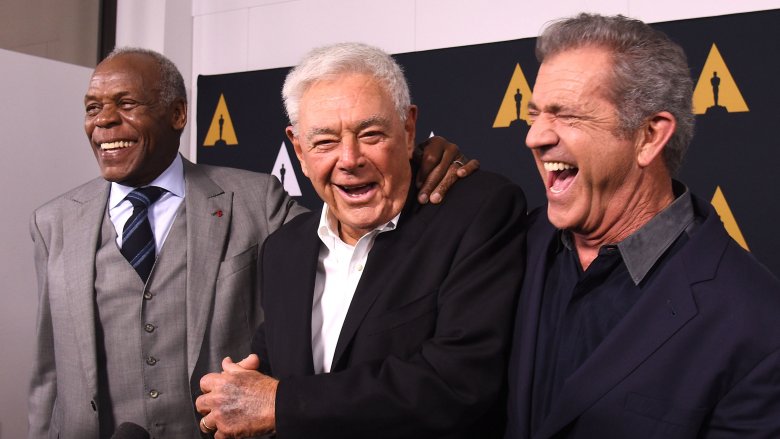The Untold Truth Of Lethal Weapon
We may receive a commission on purchases made from links.
Lethal Weapon broke down the doors on the buddy cop genre in 1987 with the tale of the unlikely friendship between loose-cannon cop Martin Riggs (Mel Gibson) and his by-the-book partner, Roger Murtaugh (Danny Glover). Roughly $120 million in worldwide grosses later, cinema had a whole new take on a tired formula.
Shane Black's script was brooding, well-paced, and action-packed. Most importantly, though, the film's character development helped it stand out from the pack in a genre mainly focused on car chases and explosions. Riggs and Murtaugh's partnership was the solid foundation the story needed, and fans couldn't help but connect with these heroes. With box office numbers through the roof, it was quickly evident that Warner Bros. had a hit on its hands.
Three decades later, the Lethal Weapon legacy is still going strong. With four films in the franchise and Fox's Lethal Weapon TV series adding a successful small-screen spinoff, it's never a bad time to look back on the movies that changed the action genre forever. Without further ado, this is the untold truth of Lethal Weapon.
Dark beginnings
Shane Black's rise to prominence is one heck of a Hollywood success story. At the age of 22, fresh out of UCLA film school, he worked up the spec script for Lethal Weapon. Halfway through the project he had a crisis of faith and briefly contemplated junking it altogether; thankfully, he snagged it from the trash and kept writing. Lethal Weapon landed with producer Joel Silver, who brought the script to Warner Bros. and helped arrange for its eventual $250,000 sale to the studio.
Black has a thing for dark, brooding buddy cop stories, as evidenced by later films like Kiss Kiss Bang Bang and The Nice Guys, and it's a tone he first struck with his original Lethal Weapon script. Drawing on everything from noir classics to Charles Bronson and Chuck Norris action hits, Black pumped genre tropes full of fresh humor and eye-catching set pieces — he wasn't only interested in subverting the action genre he loved, he was out to overhaul it for a new era.
A Trek connection
Aside from playing everyone's favorite Vulcan, Star Trek vet Leonard Nimoy enjoyed a distinguished career behind the camera. After cutting his teeth as a director on TV, Nimoy took his directing skills to the big screen with 1984's Star Trek III: The Search for Spock and 1986's Star Trek IV: The Voyage Home, all while doing double duty as Captain Kirk's (William Shatner) right hand man onscreen.
As Nimoy's directorial profile rose, Warner Bros. courted him to helm the first Lethal Weapon. Nimoy passed on the opportunity, however, choosing to pursue the 1988 Diane Keaton/Liam Neeson drama The Good Mother instead. While that film wasn't a huge hit, Nimoy still might have had the last laugh: his smash comedy Three Men and a Baby was the highest-grossing film of 1987, beating big draws like Fatal Attraction, Beverly Hills Cop II, and yes, Lethal Weapon for the top spot.
Richard Donner ended up being the producers' second choice to helm the film. As he'd demonstrated with the box office successes of films like The Goonies (which he directed) and The Lost Boys (which he executive produced), Donner's combination of action cred and genre grit was just what Lethal Weapon needed. The rest, as they say, is history.
Getting their kicks
To really prepare themselves for the roles of Riggs and Murtaugh, Mel Gibson and Danny Glover weren't just required to learn their lines and block their scenes — the actors also underwent an intensive two-month martial arts training course. The skills they learned were put to good use throughout the first Lethal Weapon, and it all culminated in the film's climactic fight scene between Riggs and Mr. Joshua, played by Gary Busey.
According to Busey, they learned a total of four different fighting styles. "We had four martial arts going," Busey explained to Andre Lima Taekwando USA. "Taekwondo, capoeira from Brazil, Brazilian Judo Jiu Jitsu, and jailhouse rock — a martial art created in prison for fighting in close quarters." According to MixedMartialArts, Lethal Weapon was "one of the first introductions films audiences had to the art of Brazilian Jiu-Jitsu." For Busey, the martial arts training he underwent was a life-changing experience: "The ambitious discipline, the follow-through, the focus it takes to make that work builds a champion of everything that is a part of you."
Marked for death
After the huge success of Lethal Weapon, Shane Black was brought back to pen the sequel. He worked on an early version of the film's story, but ended up leaving over "creative differences." Simply put: he wanted to kill off Martin Riggs.
As was alluded in the first film, Riggs had self-destructive tendencies, many of which stemmed from battling the enduring grief of losing his wife. But producer Joel Silver disagreed with Black's plans for the character, correctly noting that killing off one of the leads would put an immediate end to what was clearly a budding franchise. No one would watch a Riggs-less Lethal Weapon 3, would they? As Black later told The Hollywood Reporter, "I said: 'Guys, you want a comedy. I can't. That's just not me.' It felt like a feel-good version of a cop movie." Black gave up the reins, and Mel Gibson stayed on for the duration of the franchise.
Black and Silver butted heads over Riggs, but they continued their working relationship outside the Lethal Weapon world. After bailing on Lethal Weapon 2, Black went back to the drawing board and wrote the Bruce Willis-Damon Wayans vehicle The Last Boy Scout. Joel Silver produced the film, which, according to The Telegraph, was purchased by Warner Bros. "for the record-breaking sum of $1.75m."
Joe Pesci's Disneyland inspiration
While Joe Pesci is arguably best known for his dramatic roles in films like Raging Bull and Once Upon a Time in America, he also has comedic chops, as he proved when he played the deeply annoying federal witness Leo Getz in Lethal Weapon 2. In a 1992 interview with The New York Times, Richard Donner commented on Pesci's talent, saying, "Joe is kind of like four-wall handball with a blindfold on. You do not know where he's coming from. He knows his character inside and out. He loves to run with it, try different ways."
Aside from the physical comedy the role required, Pesci incorporated a memorable tic — repeatedly saying "okay" — into his banker-turned-private-investigator's speech pattern. As he explained to Empire, it all stemmed from a visit to the Happiest Place on Earth. "Mickey Rourke and I had gone to Disneyland," Pesci recalled. "We stopped to ask for directions from these blond-headed, blue-eyed kids. I think they were Mormons, probably. And the first word out of this kid's mouth was, 'Okay!' Then he hit me with about 12 more: 'No, no! Okay, okay, okay!' We thought it was really funny."
Lethal Weapon's secret weapon
When you think about Carrie Fisher, her work as Star Wars' Leia Organa is probably the first thing that comes to mind. Offscreen, however, she wasn't just known for her work as an actor; she was also a successful novelist — her semi-autobiographical novel Postcards from the Edge was adapted to a movie starring Meryl Streep and Shirley MacLaine — as well as one of Hollywood's top script doctors, hired to help punch up (or outright rescue) a long list of projects that includes some huge hits.
According to The Wrap, Fisher's work on Steven Spielberg's Hook "is arguably what launched her career as one of the most sought-after script doctors in Hollywood." While that film isn't viewed as one of the director's best works, it proved a good gateway for Fisher; throughout the 1990s, she was hired to doctor scripts for a whole load of blockbusters, including The Last Action Hero, Sister Act, and So I Married an Axe Murderer. In 1992, she added Lethal Weapon 3 to her list of projects, punching up the dialogue for Martin Riggs' love interest Lorna Cole, played by Rene Russo.
Introducing Jet Li
Jet Li was already a huge movie star in China when Lethal Weapon 4 came calling with his first American film role. Not only did it mark the first time Li appeared in an American movie, his performance as Wah Sing Ku was the first time he'd played a villain on the big screen. Unlike the franchise's previous antagonists, Li brought an ominous sense of stillness to his villain, grounding the sequel with his slick fighting style, which acted as a nice chaser to the bombastic action formula of the series.
While few would argue that the fourth Lethal Weapon is the best installment in the franchise, Li managed to add a truly formidable foe for the protagonists at a point when many film series have long since gone on autopilot. Dangerous Meredith's Fu Thoughts quotes Kung Fu Cult Masters by Leon Hunt, saying "Li's dramatic specialty is the tension between big (even repressed) emotions and the heroic need for reticence and control... His virtually wordless performance in Lethal Weapon 4 gives unexpected depth to what is otherwise the most stereotypical of 'inscrutable' Chinese heavies."
The fourth Lethal Weapon remains the final entry in the film franchise, but as one door closes, another opens: the movie made Li a global action star, opening the doors to other big-screen action movies like Romeo Must Die, Kiss of the Dragon, The One, Cradle 2 the Grave, and The Expendables.
Lethal Weapon 3: a real bomb
The opening moments of Lethal Weapon 3 find Riggs and Murtaugh frantically working to disarm a car bomb. As one would expect, things don't go according to plan. Yes, the bomb blows up. And yes, everyone, including a cute cat, gets out alive. But the thing that's most interesting about this sequence is that a real-life building was destroyed for the movie.
At the time, the city of Orlando had just finished construction of a new city hall and needed their old one demolished. What better way to get rid of the building than on the big screen? According to The Orlando Sentinel, the move to destroy the Soreno Hotel on camera sparked controversy in the town of St. Petersburg, Florida; a group calling themselves "Save Our St. Petersburg" protested the pending destruction. Ultimately the protest failed, and in 1992, the then-67-year-old hotel met its demise.
A company called Controlled Demolition, Inc. teamed with Warner Bros. to make the spectacle happen. "CDI worked directly with special effects crews in carefully designing an intricate delay sequence, which allowed both CDI's explosives and Warner Bros. pyrotechnics to be initiated simultaneously," their website explains. "Through the use of 180 pounds of explosives in concert with 400 special effects charges, the 33-year-old building collapsed in less than six seconds."
The sequel that almost never was
Warner Bros. struggled to compete at the box office in the late '90s, and in search of a surefire hit, they turned to Lethal Weapon 4. The fourth installment in the franchise had been in development hell since Lethal Weapon 3 hit theaters, but Warners green-lit the film in January of 1998 with a July release targeted, giving the entire cast and crew just six months to get it finished. That's a tight, but doable, turnaround — but in 1998, it was unheard of.
In addition to a major amount of location work, there were the requisite action sequences to figure out, as well as an elaborate car chase that needed to be shot. Editor Frank J. Urioste bore a particularly heavy burden, reportedly being handed a raw cut with less than a month to deliver the final version.
Arriving over a decade and many millions of dollars after the original, Lethal Weapon 4 found the franchise in a very different place — and increasingly reliant on a supporting cast that expanded to add Chris Rock alongside the returning Pesci. Audiences showed up, but the critics weren't overly kind. "New blood, provided by US chat show sensation Chris Rock as Murtaugh's new detective son-in-law and Jet Li, the now-obligatory Chinese action star, as a resilient Triad hitman, is welcome," reads Empire's review. "But not sufficient to dispel the sinking feeling that we are gathered to watch the last in a once unmissable series."
A new chapter
In 2016, Fox revived Lethal Weapon by turning it into a television series — and although film-to-TV adaptations aren't always warmly received by audiences or critics, the small-screen Weapon became a surprise hit. Unfortunately, it was dogged by real-life drama, as headlines painted a hostile behind-the-scenes picture of the show.
In April 2018, Deadline reported multiple claims against Clayne Crawford, who played Martin Riggs, stating the actor "has had a history of bad behavior on the show, and that he has been disciplined several times over complaints of emotional abuse and creating a hostile environment." Further details over the alleged incidents soon came to light, pointing to a strained relationship between Crawford and his co-star Damon Wayans, who played Roger Murtaugh. TVLine soon followed up on the report, floating the possibility that Warner Bros. and Fox would consider firing Crawford and replacing him with another actor.
The following month, The Hollywood Reporter revealed that Crawford wouldn't be returning to the show. As his character suffered a life-threatening injury in the show's season 2 finale, Crawford took to Twitter to react to the news, quipping, "You can't fire me on my day off!"
Richard Donner's Lethal Weapon 5 dreams
After some false starts, rumors started circulating in 2017 that Richard Donner was getting the Lethal Weapon crew back together to make another movie, and Cinema Blend reported in December that Mel Gibson and Danny Glover were on board for Lethal Weapon 5.
In Hollywood, however, even once a project seems like a done deal, something can still stall it. As Donner explained on Nerdist's Maltin on Movies podcast, the biggest hurdle is the studio's own legal team. "I'm ready to do 5. It's called Lethal Finale. It's very dark. And we were all set to go and now Warner Bros. is doing their old-fashioned tricks," said Donner. "They have these people in the legal department who do the negotiating in the most counter-productive way. They should be sent to a studio and work with the producers and directors and actors, and learn what makes a film, and then negotiate. But it's just embarrassing."
With the TV show's future uncertain and the developmental hell the fifth installment has found itself in, the Lethal Weapon franchise has seen brighter days. But if we've learned anything about Riggs and Murtaugh, it's that you can never count them out.
